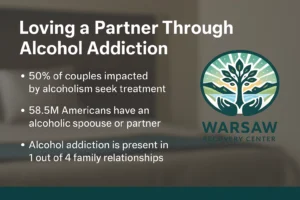There wasn’t a single moment I “knew.”
No dramatic rock-bottom scene. No intervention. No bottles crashing to the floor. Just a slow erosion of things I used to love: our laughter, our safety, our sleep.
I didn’t wake up one day and decide to change everything. I woke up one day and realized I hadn’t felt like myself in months. I was bone-tired. Emotionally threadbare. Still in love—but completely lost.
Loving someone in active alcohol addiction is a kind of heartbreak that hides itself well. You become skilled at surviving—dodging triggers, managing moods, covering tracks. And before you know it, their addiction becomes your life.
Getting them into alcohol addiction treatment in Virginia wasn’t a clean decision. It was a final thread I grabbed before everything fell apart.
And it ended up saving us both.
Loving Them Didn’t Mean I Could Save Them
I used to believe that love could be enough.
If I just said the right thing at the right time…
If I just poured more compassion into the empty spaces…
If I just held them through the darkness…
But no matter how much I tried, it was like pouring water into a bucket with a hole in the bottom.
I was giving everything, and it was never enough—not because I was failing, but because I was fighting the wrong battle.
Love is powerful. But it’s not a substitute for treatment. It can be the reason someone gets help. But it can’t be the help.
Alcohol Addiction Had Quietly Rewritten Our Relationship
It’s hard to explain what alcohol addiction does to a relationship when you’re still inside of it.
We still had good days. We still said “I love you.” We still had inside jokes and shared playlists and plans for the future.
But slowly, alcohol became the third person in our relationship—always present, always unpredictable.
I started organizing my life around it without realizing.
Should I bring up that topic? Have they been drinking yet today? Can I count on them tonight?
I stopped asking how I felt. I was too busy managing their mood, their energy, their shame.
The scary part? I got good at it.
The Breaking Point Wasn’t a Crisis—It Was a Whisper
No screaming match. No DUI. No ambulance.
Just one night, sitting at the edge of the bed, staring at their sleeping body—again.
I whispered to myself, This is not what love is supposed to feel like.
It was the smallest admission. But once it slipped out, I couldn’t un-hear it.
That’s when I reached out to Warsaw Recovery Center. I didn’t know what I was asking for—just that I couldn’t keep doing this alone.
Alcohol Addiction Treatment Gave Us Structure and Support
Calling a treatment center felt scary. What if they judged us? What if they told me to leave? What if it meant I was giving up?
But that’s not what happened.
The person who answered the phone didn’t flinch when I cried. They didn’t rush me. They didn’t make promises. They just offered next steps—simple, human ones.
Alcohol addiction treatment meant my partner had medical support, therapy, and a safe place to stabilize. It also meant I had space to breathe.
For the first time, I wasn’t managing the chaos. I wasn’t hiding wine bottles or making excuses. I wasn’t bracing for disappointment.
We were in a different kind of fight now—a real one. With help.
I Had to Do My Own Work Too
This part surprised me.
I thought if they got sober, we’d be fine. But the truth? I had to recover too.
I had learned patterns of silence, control, hypervigilance. I had stopped trusting my own emotions. I was still operating in survival mode—even after they were in treatment.
So I started therapy. I went to support groups for partners. I learned that loving someone doesn’t mean disappearing into their recovery.
Healing together meant healing individually first.
The Relationship Didn’t “Go Back”—It Moved Forward
Treatment didn’t give us back our old relationship.
It gave us something better: honesty, boundaries, emotional safety.
Was it easy? No. There were relapses. Fights. Doubts. Awkward rebuilding phases.
But the difference was—we had tools. We had language. We had people to call when things got hard.
And we had something we hadn’t had in a long time:
Hope.
FAQ: When You’re the Partner of Someone Struggling with Alcohol
What if my partner doesn’t think they need treatment?
That’s common. Many people don’t see the full impact of their drinking until someone holds up a mirror. You don’t have to convince them overnight. A compassionate conversation and a resource (like Warsaw Recovery Center) can be a starting point.
Is it wrong to ask for help if I’m not the one drinking?
Not at all. Living with or loving someone in active addiction is a form of trauma. Your exhaustion is valid. Your pain matters. You’re allowed to get support, whether or not your partner is ready.
Can alcohol addiction treatment really help a relationship?
Yes—but only if both people are willing to do their part. Treatment offers tools for communication, boundary setting, emotional regulation, and accountability. It’s not magic, but it’s a path.
Should I stay or should I leave?
That’s a personal decision—and no blog can answer it for you. What I can say is this: You don’t have to decide everything today. Get support. Get clear. Then move from a place of care, not chaos.
What if I already feel like I’ve lost them?
Then you have nothing to lose by reaching out. Treatment might not fix everything. But it creates the conditions for healing—if not the relationship, then at least your own heart.
The Best Decision I Made Was Letting Go of “Fixing” and Asking for Help
I used to think that if I just held on tighter, they’d get better.
But it was the opposite.
It was only when I let go—when I stopped rescuing, stopped explaining, stopped twisting myself into knots—that real change could happen.
Getting them into alcohol addiction treatment in Warsaw, Virginia wasn’t me giving up.
It was me finally saying: “We deserve better than this. Both of us.”
And for the first time, we actually believed it.
Call (888) 511-9480 to learn more about our Alcohol Addiction Treatment services in Warsaw, Virginia.
If you’re loving someone through the pain of alcohol addiction, you’re not weak. You’re not alone. And it’s not too late for things to change.


